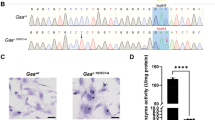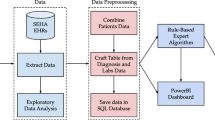Abstract
As the management of Pompe disease depends on whether an individual has infantile onset Pompe disease (IOPD) or late onset Pompe disease (LOPD), the question of whether the phenotype can be predicted from specific pathogenic variants is becoming increasingly important. We reviewed published cases of Pompe disease in which IOPD versus LOPD and pathogenic GAA variants were assigned for specific individuals. We then compared variant types and locations versus phenotypes. We identified 115 cases, 42 with IOPD and 73 with LOPD. We found that two features of GAA variants can help predict phenotype: (1) presence of a splice variant on at least one allele and (2) ___location in specific protein domains. These findings help provide prognoses for newborns diagnosed with Pompe disease. Our analysis will also help expecting and prospective parents who pursue genetic testing as they consider therapeutic options that may be beneficial to implement soon after birth.
This is a preview of subscription content, access via your institution
Access options
Subscribe to this journal
Receive 12 print issues and online access
269,00 € per year
only 22,42 € per issue
Buy this article
- Purchase on SpringerLink
- Instant access to full article PDF
Prices may be subject to local taxes which are calculated during checkout

Similar content being viewed by others
Data availability
All of our primary data are presented in the Supplement.
References
Martiniuk F, Mehler M, Pellicer A, Tzall S, La Badie G, Hobart C, et al. Isolation of a cDNA for human acid alpha-glucosidase and detection of genetic heterogeneity for mRNA in three alpha-glucosidase-deficient patients. Proc Natl Acad Sci USA. 1986;83:9641–4.
Hers HG. α-Glucosidase deficiency in generalized glycogen-storage disease (Pompe’s disease). Biochem J. 1963;86:11–6.
Pompe Disease | National Institute of Neurological Disorders and Stroke [Internet]. [cited 2024 Jan 13]. Available from: https://www.ninds.nih.gov/health-information/disorders/pompe-disease.
Holmes JM, Houghton CR, Woolf AL. A Myopathy presenting in adult life with features suggestive of glycogen storage disease. J Neurol, Neurosurg Psychiatry. 1960;23:302–11.
Van den Hout H, Reuser AJ, Vulto AG, Loonen MC, Cromme-Dijkhuis A, Van der Ploeg AT. Recombinant human alpha-glucosidase from rabbit milk in Pompe patients. Lancet. 2000;356:397–8.
Van den Hout JMP, Kamphoven JHJ, Winkel LPF, Arts WFM, De Klerk JBC, et al. Long-term intravenous treatment of Pompe disease with recombinant human alpha-glucosidase from milk. Pediatrics. 2004;113:e448–57.
Kishnani PS, Nicolino M, Voit T, Rogers RC, Tsai ACH, Waterson J, et al. Chinese hamster ovary cell-derived recombinant human acid alpha-glucosidase in infantile-onset Pompe disease. J Pediatr. 2006;149:89–97.
Winkel LPF, Van den Hout JMP, Kamphoven JHJ, Disseldorp JAM, Remmerswaal M, Arts WFM, et al. Enzyme replacement therapy in late-onset Pompe’s disease: a three-year follow-up. Ann Neurol. 2004;55:495–502.
van der Ploeg AT, Clemens PR, Corzo D, Escolar DM, Florence J, Groeneveld GJ, et al. A randomized study of alglucosidase alfa in late-onset Pompe’s disease. N. Engl J Med. 2010;362:1396–406.
Wang RY, Bodamer OA, Watson MS, Wilcox WR. ACMG Work Group on Diagnostic Confirmation of Lysosomal Storage Diseases. Lysosomal storage diseases: diagnostic confirmation and management of presymptomatic individuals. Genet Med. 2011;13:457–84.
Wens SCA, Kroos MA, de Vries JM, Hoogeveen-Westerveld M, Wijgerde MGJM, van Doorn PA, et al. Remarkably low fibroblast acid α-glucosidase activity in three adults with Pompe disease. Mol Genet Metab. 2012;107:485–9.
Viamonte MA, Filipp SL, Zaidi Z, Gurka MJ, Byrne BJ, Kang PB. Phenotypic implications of pathogenic variant types in Pompe disease. J Hum Genet. 2021;66:1089–99.
Montalvo ALE, Bembi B, Donnarumma M, Filocamo M, Parenti G, Rossi M, et al. Mutation profile of the GAA gene in 40 Italian patients with late onset glycogen storage disease type II. Hum Mutat. 2006;27:999–1006.
Hermans MMP, van Leenen D, Kroos MA, Beesley CE, Van Der Ploeg AT, Sakuraba H, et al. Twenty-two novel mutations in the lysosomal alpha-glucosidase gene (GAA) underscore the genotype-phenotype correlation in glycogen storage disease type II. Hum Mutat. 2004;23:47–56.
Patel TT, Banugaria SG, Case LE, Wenninger S, Schoser B, Kishnani PS. The impact of antibodies in late-onset Pompe disease: a case series and literature review. Mol Genet Metab. 2012;106:301–9.
Bali DS, Tolun AA, Goldstein JL, Dai J, Kishnani PS. Molecular analysis and protein processing in late-onset Pompe disease patients with low levels of acid α-glucosidase activity. Muscle Nerve. 2011;43:665–70.
Echaniz-Laguna A, Carlier RY, Laloui K, Carlier P, Salort-Campana E, Pouget J, et al. SHOULD patients with asymptomatic pompe disease be treated? A nationwide study in france. Muscle Nerve. 2015;51:884–9.
Elder ME, Nayak S, Collins SW, Lawson LA, Kelley JS, Herzog RW, et al. B-Cell depletion and immunomodulation before initiation of enzyme replacement therapy blocks the immune response to acid alpha-glucosidase in infantile-onset Pompe disease. J Pediatr. 2013;163:847–54.e1.
Chan MY, Jalil JA, Yakob Y, Wahab SAA, Ali EZ, Khalid MKNM, et al. Genotype, phenotype and treatment outcomes of 17 Malaysian patients with infantile-onset Pompe disease and the identification of 3 novel GAA variants. Orphanet J Rare Dis. 2023;18:231.
Roig-Zamboni V, Cobucci-Ponzano B, Iacono R, Ferrara MC, Germany S, Bourne Y, et al. Structure of human lysosomal acid α-glucosidase–a guide for the treatment of Pompe disease. Nat Commun. 2017;8:1111.
Sawada T, Kido J, Nakamura K. Newborn Screening for Pompe Disease. Int J Neonatal Screen. 2020;6:31.
Acknowledgements
No funding or in kind support was provided for this study.
Funding
The authors did not receive grants or any in kind support for this project. No funding or in kind support was provided for this study.
Author information
Authors and Affiliations
Contributions
GR collected the primary data, conducted the analyses, and drafted the manuscript. NRP, SAS, and PIK critically reviewed the analyses and manuscript for important intellectual content. PBK supervised all aspects of the project, reviewed the data, and edited the manuscript.
Corresponding author
Ethics declarations
Competing interests
The authors declare no competing interests.
Ethical approval
Ethical approval was not required as all cases reviewed were from the published literature.
Additional information
Publisher’s note Springer Nature remains neutral with regard to jurisdictional claims in published maps and institutional affiliations.
Rights and permissions
Springer Nature or its licensor (e.g. a society or other partner) holds exclusive rights to this article under a publishing agreement with the author(s) or other rightsholder(s); author self-archiving of the accepted manuscript version of this article is solely governed by the terms of such publishing agreement and applicable law.
About this article
Cite this article
Rajamani, G., Pillai, N.R., Stafki, S.A. et al. Predicting the phenotype of Pompe Disease from features of GAA variants. Eur J Hum Genet 33, 688–691 (2025). https://doi.org/10.1038/s41431-024-01771-z
Received:
Revised:
Accepted:
Published:
Issue Date:
DOI: https://doi.org/10.1038/s41431-024-01771-z



